Action
The billionaire, Bollywood and the future of Indian football

MUMBAI (Reuters) – A storm could be brewing in India’s top-flight football, a glamorous and acrimonious world that encompasses Asia’s richest man, the cream of Bollywood and a self-styled former gangster.
Mukesh Ambani, the billionaire tycoon who commands the Reliance Industries corporate empire that owns the Indian Super League, is facing pushback to his family’s dominance from some executives in the country’s football association and clubs.
At stake is the financial future of football in a country devoted to cricket. The outcome of the power struggle could also help shape whether India can ever become a world force in the game, realising ex-FIFA president Sepp Blatter’s description of being a “sleeping giant” – and, of course, the big dream: whether it can one day play in or even host a World Cup.
Ambani’s holding group launched the Indian Super League, an elite competition of newly created teams, in 2014 with the aim of attracting investment and big global names, much like the Indian Premier League has in cricket.
However tensions have been building over who ultimately calls the shots: the Indian football association, which technically governs football at all levels, or Ambani’s group which owns the top league of 10 teams.
It’s a rare power split in global football, and a recent dispute between Ambani’s camp and the association illustrated differing visions over the direction of the Indian game, whose national team is ranked 108th globally.
This year, before the COVID-19 pandemic, a top executive at India’s football association, Kushal Das, wrote to Martin Bain, the Ambani lieutenant who heads Football Sports Development Limited (FSDL), a Reliance holding company that owns the league.
The national coach, employed by the association, has complained that the enlisting of so many foreign recruits in Indian football could hold back the development of home-grown players. Das, in a March email exchange seen by Reuters, said the governing body had the right to limit the number of foreign players allowed to compete in the Super League.
The dismissal was swift.
“Contrary to the position in your email, all competition regulations rather need approval from FSDL,” Bain responded, according to a copy of the email exchange seen by Reuters.
The football association backed down for this season.
Representatives for Reliance and FSDL did not respond to repeated requests for comment for this article. The football association’s media director, Nilanjan Datta, declined to comment, but said questions about tensions with FSDL were “baseless”.
Requests for comment from Bain and Das, via FSDL and the association, were not responded to.
Indian game of two halves
The player issue is disputed globally; some argue imported veterans stand in the way of domestic talent, while others say they haul up standards and share skills and experience.
But the exchange also reflects a conflict within the Indian game.
FSDL and the Ambani family’s supporters says the Super League has raised awareness and money for a disorderly and underinvested sector, and brought in marquee players such as Italy’s Alessandro Del Piero and France’s Robert Pires.
Ambani’s wife Nita, FSDL’s chair and the public face of the league, has expressed hope India will qualify for the 2026 World Cup, and one day host the event. And some Super League club owners are committed to what they consider a football revolution.
“Indian players are benefiting from the arrival of quality foreigners and coaches,” said Mandar Tamhane, CEO of JSW Bengaluru FC. “Football has become a lot more tactical and technical,” he added. “The exposure has helped Indian football develop.”
But the Ambanis’ influence is resented by some club owners in India’s traditional football league, the I-League, who say the Super League is sucking attention and investment from the rest of the game and stunting its long-term development.
ADVERTISEMENT
“This is a hostile takeover if there ever was one. They basically own football,” said Ranjit Bajaj, a self-described former gangster who found redemption in football, and a prominent figure in the game who took Punjab’s I-League side to a national championship in 2018 as its owner. “It’s really sad.”
The Ambanis did not respond to requests for comment made via Reliance.
The family is accustomed to domestic business dominance.
The Reliance empire, with a market value of about $153 billion, includes India’s leading telecom firm, a major retailer, its largest refining complex, a news outlet and a Bollywood studio. The group’s revenue last fiscal year accounted for around 3% of India’s $2.9 trillion economy.
‘Such a difficult situation’
Reliance and partner IMG Worldwide bailed out the cash-strapped football association a decade ago, pledging around $140 million over 15 years in return for sponsorship, licensing rights and running the Super League.
The association remains dependent on the deal money. It sent six emails to Reliance executives between May and October last year, reviewed by Reuters, saying payments of $6 million had not been received. One warned of a “severe cash flow crunch” and said the association had to put payments to suppliers on hold.
A Reliance executive answered twice, once saying it would take more time to release the payment and then saying the payment was in process.
Reliance did not respond to requests for comment on this email exchange.
The football association has considered whether it would be possible to renegotiate parts of the contract, according to an audio recording reviewed by Reuters of its president speaking to I-League executives at a meeting last year, although it is not clear which parts.
“When you’re dealing with a giant like FSDL, whose parent is Reliance, legally you will land up in such a difficult situation,” association President Praful Patel said in the July meeting.
He said FSDL had saved the association from falling into debt, adding “They have invested so much money.”
Patel did not respond to requests for comment made via the football association.
Business meets Bollywood
Thus far, however, the Super League itself is proving neither hugely popular nor lucrative – a rarity for an Ambani venture. Stadium attendances have halved over the past six years, and the pandemic is likely to worsen the situation.
Of course, creating a profitable league in cricket-mad India was always going to be a tough task. But industry veterans say Ambani erred by excluding India’s original clubs and creating a standalone tournament without promotion or relegation.
“It was 100% a wasted opportunity. The money coming in is welcome, but it should be spent in a proper manner – not just creating a hype,” said leading sports commentator Novy Kapadia.
The Super League’s original eight clubs were owned by Bollywood heavyweights like Ranbir Kapoor, cricket champions including Sachin Tendulkar and prominent businessmen, though several have since exited. Two new teams joined in 2017.
Ambani’s group initially projected, in 2014, that clubs would be profitable within about five years, according to an industry source with direct knowledge of the matter.
However none of original eight clubs, whose latest financial statements were reviewed by Reuters, had broken even by March 2019, save for Bengaluru, with about $234,000 in profit.
FSDL, of which Reliance owns 65% and Walt Disney-owned broadcaster Star India 35%, has significant control over clubs, according to a draft 2014 contract seen by Reuters.
Clubs must select coaches from a league-approved list, cannot sell shares without approval and must spend at least $500,000 per season on marketing.
Star India referred questions to FSDL.
Sports commentator Kapadia said the league’s future depended on billionaires continuing to bankroll their clubs, especially as the next season could be delayed and played without foreign players or spectators due to the coronavirus.
“The hit will be very severe,” he said, but added the league would continue “as long as there are enough rich people in India to burn money”.
Reporting and photo: Reuters
Action
Sun Siyam Olhuveli invests in staff wellbeing with upgraded sports facilities
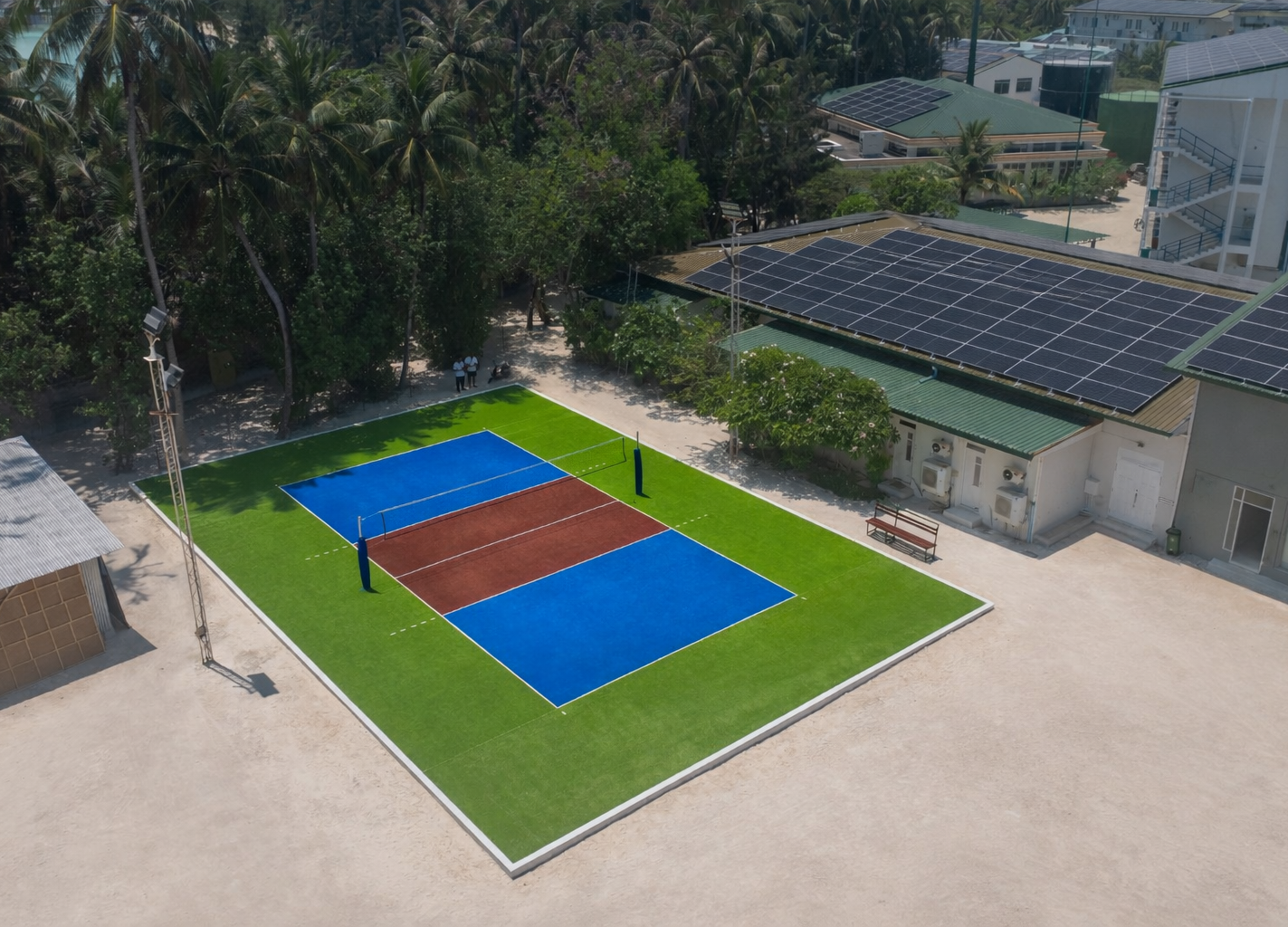
Sun Siyam Olhuveli has unveiled newly upgraded volleyball and futsal grounds for team members, reaffirming its commitment to employee wellbeing while advancing responsible, future-focused operations. The renovated volleyball grounds were officially inaugurated on 14 February, while the upgraded futsal ground opened earlier this year—together creating dedicated spaces for recreation, connection, and healthy competition across the island.
Designed to encourage regular physical activity and camaraderie beyond the workplace, the improved sports facilities represent a thoughtful investment in social infrastructure. They reflect a belief that wellbeing is fundamental to long-term performance, nurturing morale, teamwork, and a strong sense of belonging among team members.
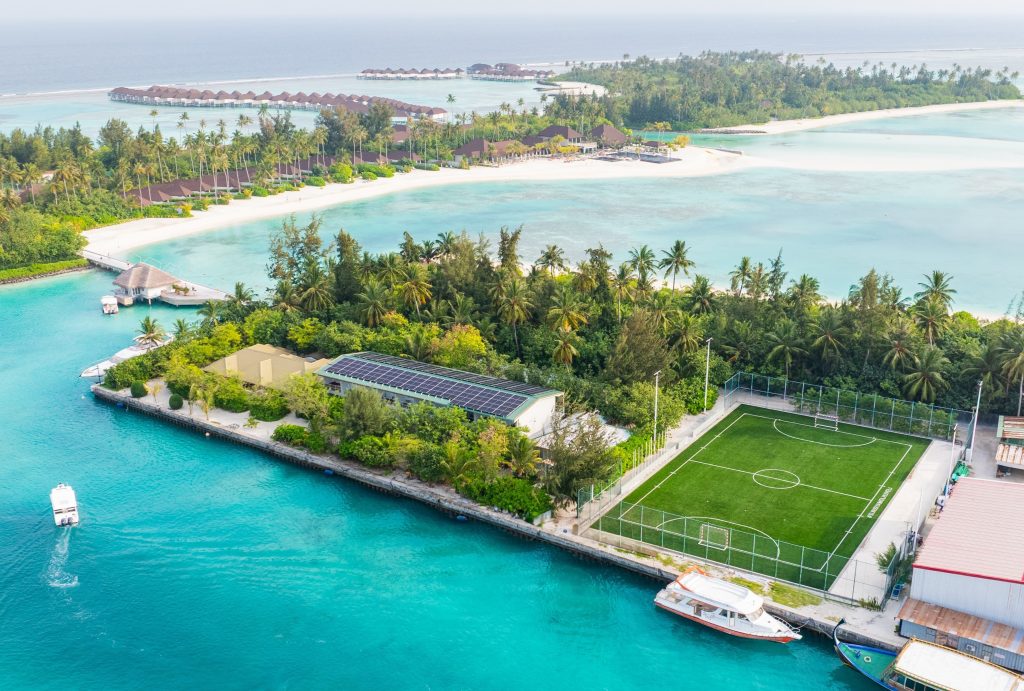
Alongside these developments, the resort has implemented NO BIN DAY every Tuesday, a practical initiative aimed at minimising food waste across operations. By encouraging mindful planning and responsible consumption, the initiative challenges teams to rethink habits around food—transforming sustainability into a shared, everyday discipline.
“Taking care of our people and the environment must go hand in hand. By investing in spaces that support our team’s wellbeing and introducing simple disciplines like NO BIN DAY, we are building a culture where responsibility is lived every day—naturally, collectively, and with purpose,” said Hassan Adil, General Manager of Sun Siyam Olhuveli.
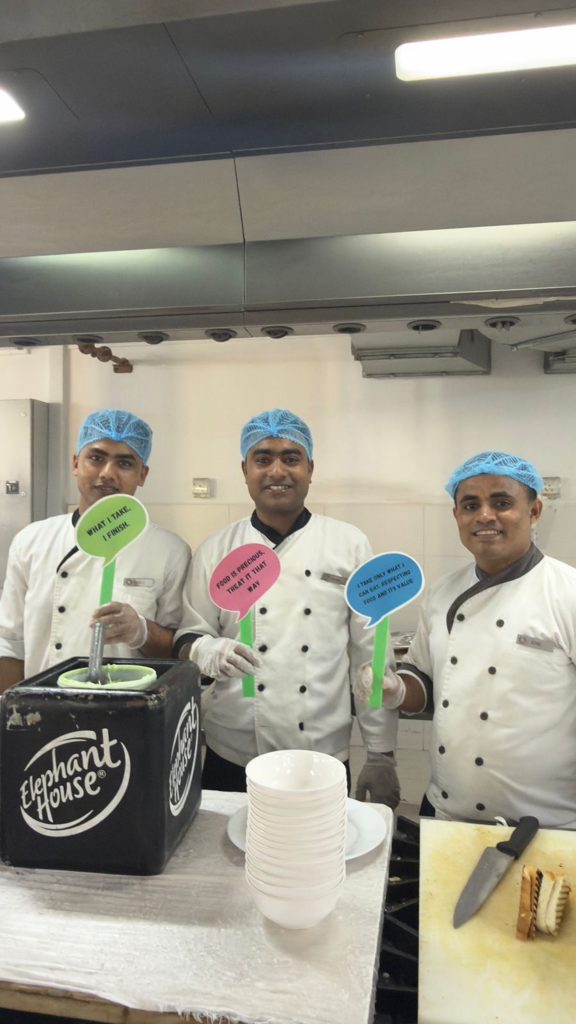
Both initiatives form part of Sun Siyam Care, the group’s corporate social responsibility platform, and align with the Social Infrastructure and Responsible Consumption and Production pillars under the GDS framework. Together, they reflect a people-first approach to sustainability—where everyday actions create lasting impact for teams, operations, and the wider community.
Sun Siyam Care is committed to creating a positive impact for people, communities, and the environment through responsible operations, social investment, and long-term sustainability actions across its destinations in the Maldives and Sri Lanka.
Guests are encouraged to learn more about these initiatives by visiting the Sun Siyam Care website at sunsiyam.com/sun-siyam-care.
Action
Sheraton Maldives Full Moon celebrates sixth anniversary of Reefscapers collaboration
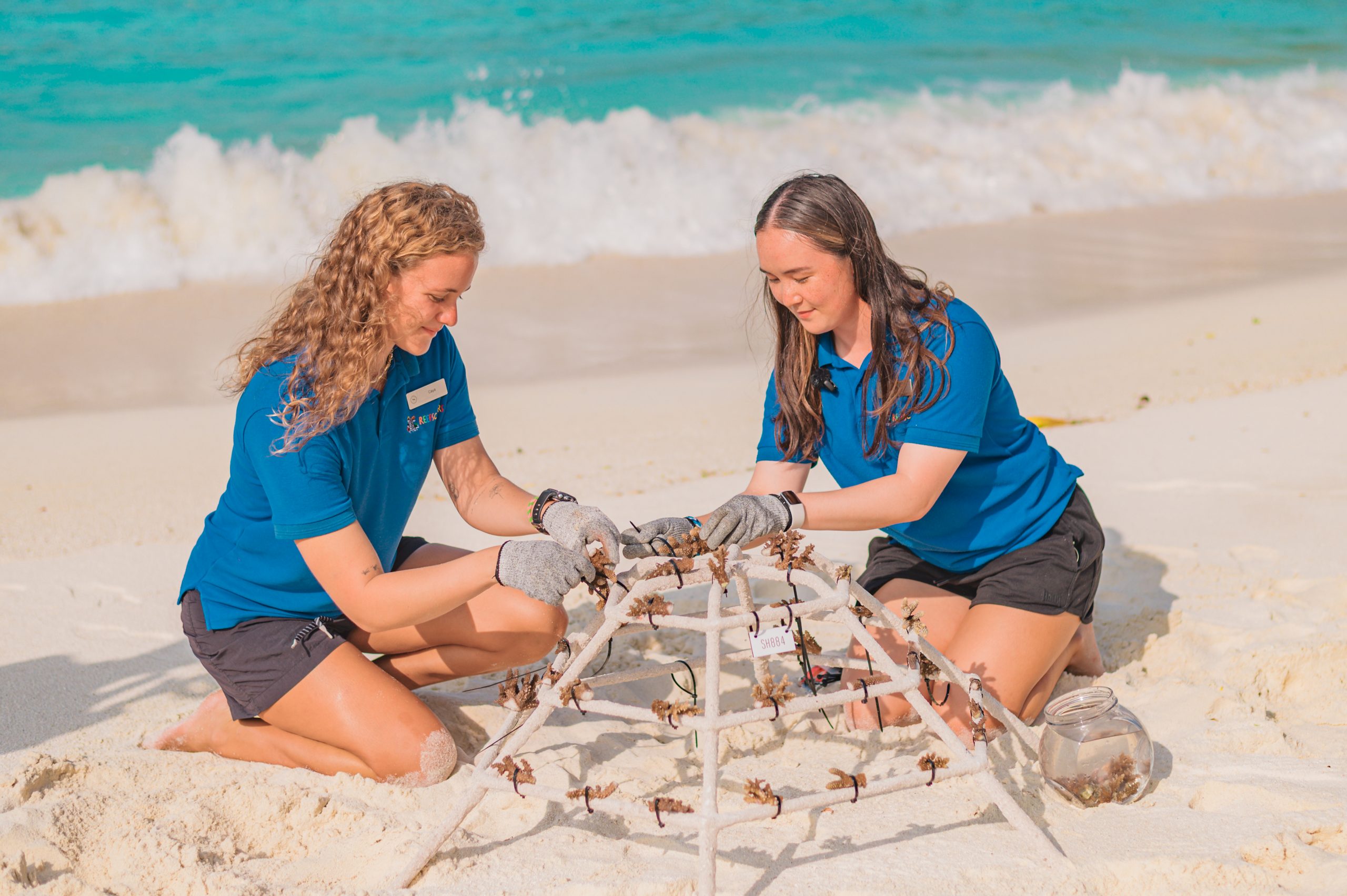
Sheraton Maldives Full Moon Resort & Spa marks the sixth anniversary of its partnership with Reefscapers on February 19, 2026, reaffirming its commitment to protecting and restoring the Maldives’ fragile reef ecosystems. Since launching the partnership in 2020, the resort and Reefscapers have worked together to restore coral habitats, support marine biodiversity, and engage guests in meaningful conservation experiences. The milestone also marks one year since the successful relocation of approximately five tons of coral to the resort’s house reefs — one of the partnership’s most significant conservation initiatives.
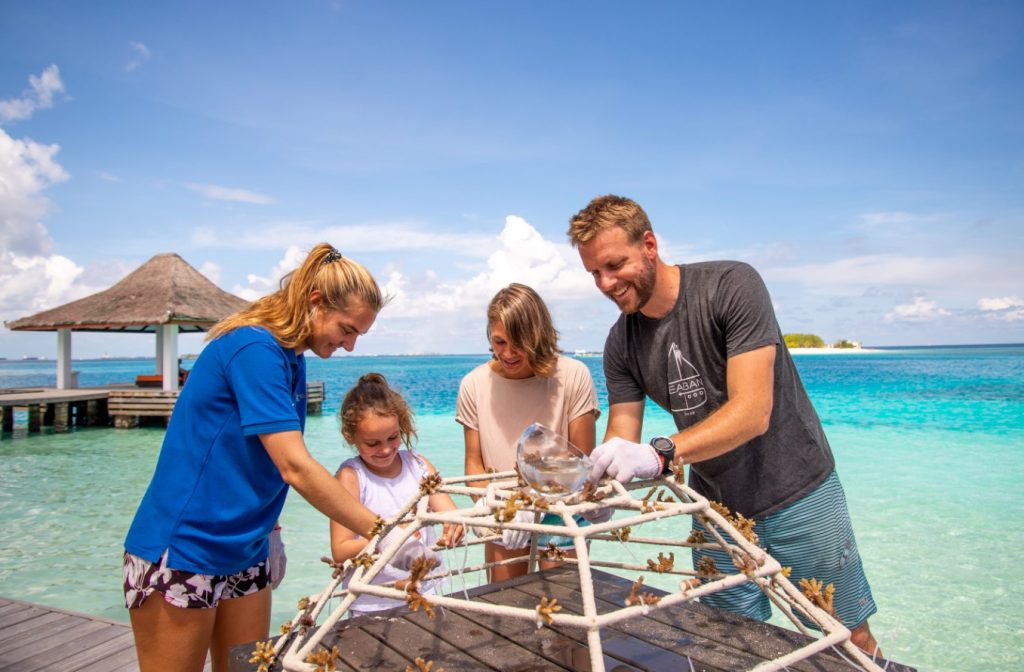
Over the past six years, the partnership has become a defining pillar of the resort’s sustainability journey, blending scientific restoration with purposeful guest engagement. To date, the initiative has resulted in the planting of 898 coral frames, supporting approximately 33,000 coral colonies now growing across the restoration sites. Through coral propagation, reef monitoring, and awareness programmes, these efforts continue to regenerate reef structures while deepening understanding of the essential role coral ecosystems play in sustaining marine life and protecting coastlines. Each thriving coral frame reflects a shared dedication to preserving the natural wonders that make the Maldives one of the world’s most extraordinary marine destinations.
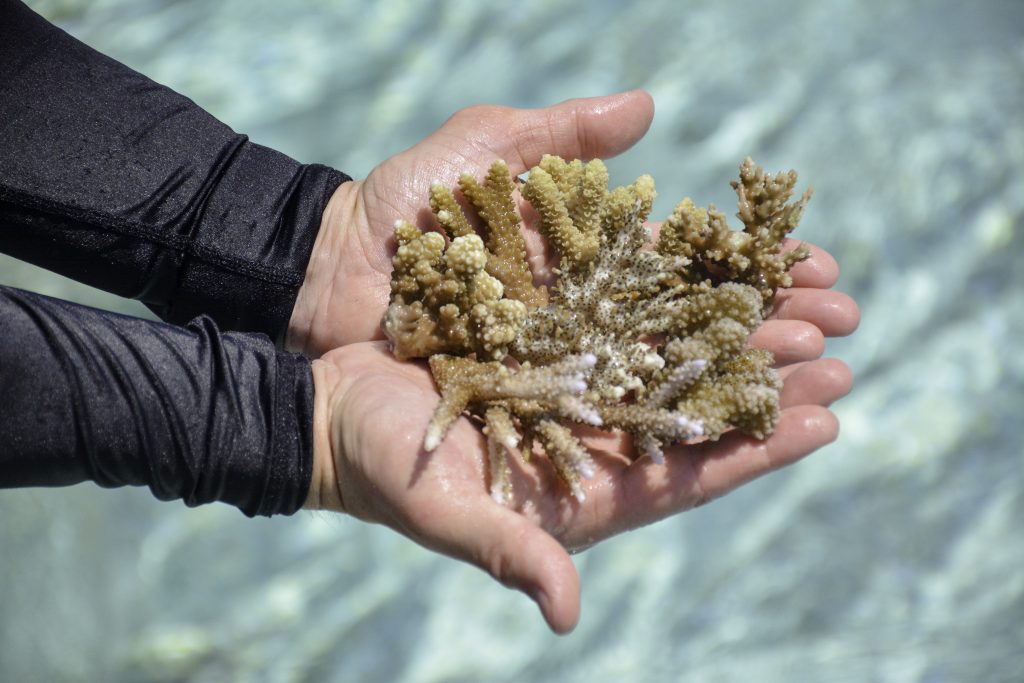
“What makes this partnership special is seeing how small, consistent actions turn into real change underwater. Watching the relocated corals settle, survive, and begin to grow over the past year has been incredibly rewarding for us and the guests who return and witness how they’ve helped restore a living reef,” shares Katelyn, the resort’s Marine Biologist.
A defining achievement of the collaboration has been the coral relocation project, which carefully transferred coral colonies from Ras Malé, also known as the Maldives Eco City, to the resort’s dedicated restoration site, safeguarding them from potential threats linked to land reclamation activities in the Fushi Dhiggaru Lagoon. One year on, these corals continue to flourish beneath the surface, strengthening reef resilience and contributing to the long-term health of the surrounding ecosystem.
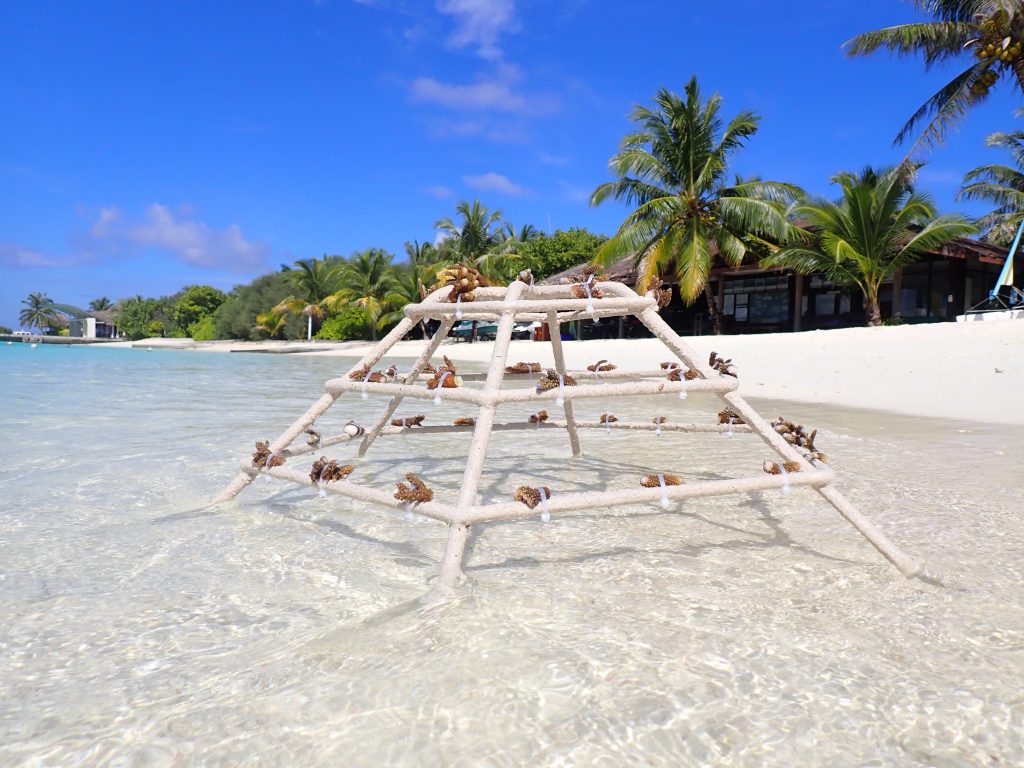
At the heart of the partnership lies the resort’s Adopt a Coral programme, part of the Good Travel with Marriott Bonvoy initiative, which encourages guests to travel with intention through meaningful environmental experiences. Through this hands-on activity, visitors can adopt and name a coral frame while learning directly from marine experts about coral ecology and the importance of protecting marine habitats.
To deepen this connection beyond the stay, guests receive growth updates on their adopted corals every six months, allowing them to follow the progress of their living contribution to the reef. As these corals grow over time, they become enduring symbols of renewal and shared responsibility, transforming a holiday memory into a lasting environmental legacy, and reflecting how travel can positively support local ecosystems and communities.
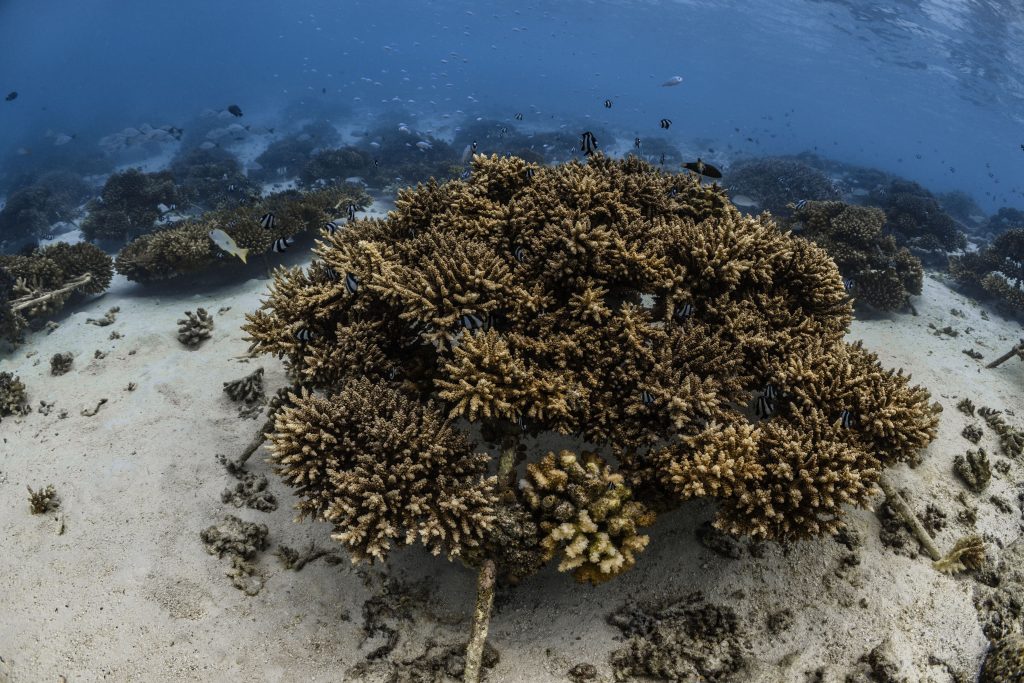
“Our island is surrounded by a remarkable marine environment, and protecting it is a responsibility we take seriously. Our partnership with Reefscapers reflects our belief that hospitality should go hand in hand with stewardship. Seeing the reef restoration progress over the past six years, and the involvement of our guests and associates in that journey, makes this anniversary especially meaningful for all of us,” comments Greg Allan, General Manager of Sheraton Maldives Full Moon Resort & Spa.
Through its continued collaboration with Reefscapers, Sheraton Maldives Full Moon Resort & Spa remains dedicated to advancing marine conservation while creating purposeful guest experiences rooted in sustainability, education, and connection to nature.
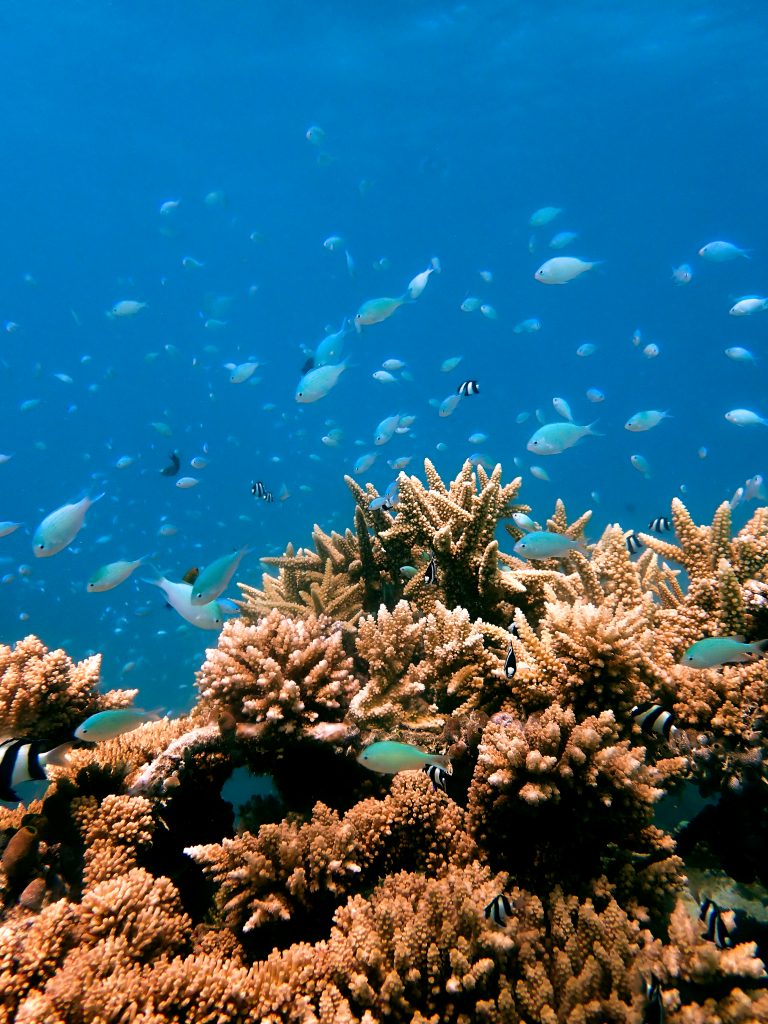
To discover more about the resort’s sustainability initiatives, join the Adopt a Coral programme, or plan a stay that supports reef conservation, visit sheratonmaldives.com or contact the reservations team at Sheraton.Maldives@sheraton.com.
Action
Sun Siyam Vilu Reef unveils expanded marine excursion portfolio

Sun Siyam Vilu Reef, part of the Sun Siyam Privé Collection, has introduced an expanded portfolio of water-based experiences designed to showcase the natural environment and marine life of the surrounding atolls. The enhanced programme combines exploration, activity and moments of calm, offering guests new ways to experience the Maldives through curated ocean journeys and personalised excursions.
Building on established activities such as Jet Car rides, SeaBob adventures and windsurfing, the resort has expanded its watersports offering to include private speedboat journeys and bespoke marine experiences. These additions are tailored for small groups seeking intimate and meaningful encounters with the ocean.
Available daily from the resort’s Watersports Centre, the new private speedboat excursions provide a personalised way to explore the hidden marine sites of Dhaalu Atoll. Designed for one to four guests, each journey offers flexibility and individual attention. Guests may choose from four-hour, five-hour or full-day itineraries, all of which include a freshly prepared barbecue lunch. From coral gardens to secluded sandbanks, the excursions highlight the region’s diverse marine landscapes.
The programme’s centrepiece is the Full Day Adventure Trip, which offers an extended exploration of key marine locations. Highlights include the Coral Garden, known for its biodiversity and reef formations; Turtle Point, where sea turtles are frequently sighted; and Nurse Shark Point, which provides opportunities to observe nurse sharks in their natural environment. The experience concludes with a beachside lunch on a private sandbank, set against uninterrupted views of the Indian Ocean.
For guests seeking a balance between activity and relaxation, the Waves of Adventure and Calmness experience combines a private two-hour snorkelling safari or Jet Ski safari with a full-body massage at the resort. The programme is designed to transition smoothly from ocean exploration to restorative island time, reflecting the relaxed pace that characterises Sun Siyam Vilu Reef.
As part of the Sun Siyam Privé Collection, Sun Siyam Vilu Reef continues to focus on personalised service and experiences rooted in the natural setting of the Maldives. Through its expanded watersports offering, the resort invites guests to engage with the marine environment while enjoying a sense of privacy, discovery and connection to the Maldivian seascape.
-

 Cooking1 week ago
Cooking1 week agoA spring of flavours: Nowruz dining series at JW Marriott Maldives Resort & Spa
-

 News1 week ago
News1 week agoPulse Hotels & Resorts unveils Aura Maldives, a mindful luxury sanctuary
-
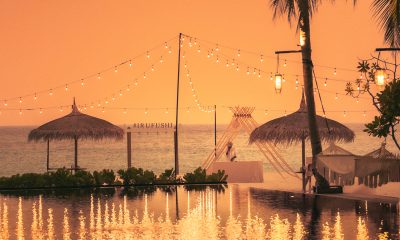
 News1 week ago
News1 week agoSun Siyam Iru Fushi sets new nenchmark with 24 Hour Premium All Inclusive Dine Around
-

 Fitness1 week ago
Fitness1 week agoOUTRIGGER Maldives Maafushivaru launches expanded wellness programming for 2026
-
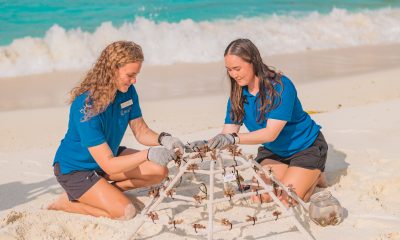
 Action1 week ago
Action1 week agoSheraton Maldives Full Moon celebrates sixth anniversary of Reefscapers collaboration
-
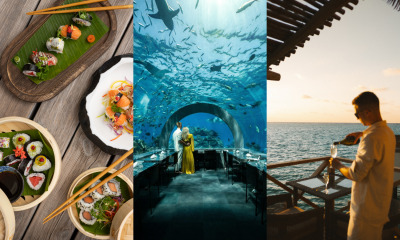
 Featured1 week ago
Featured1 week agoYou & Me Maldives unveils curated Premium All Inclusive programme
-

 Awards6 days ago
Awards6 days agoCentara Mirage Lagoon Maldives named Luxury Family Friendly Resort of the Year
-
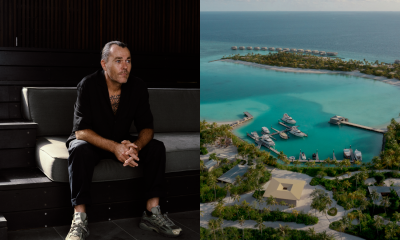
 Cooking1 week ago
Cooking1 week agoPatina Maldives hosts Chef Shannon Bennett for exclusive April residency









